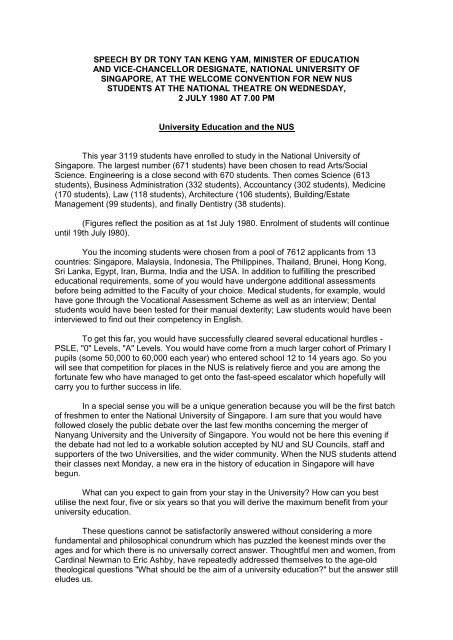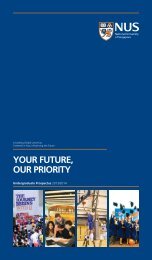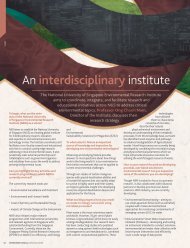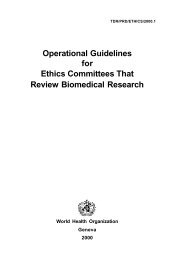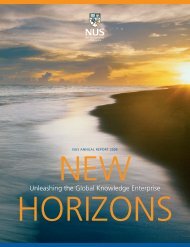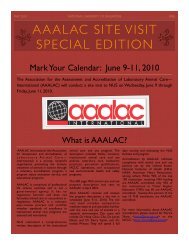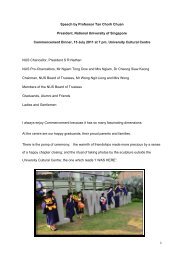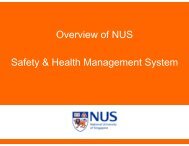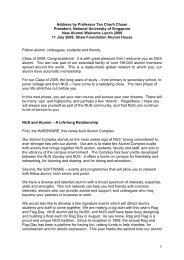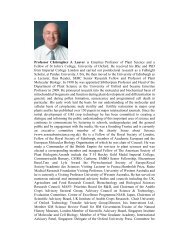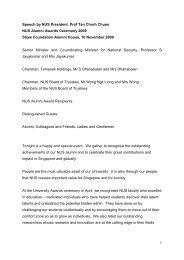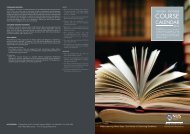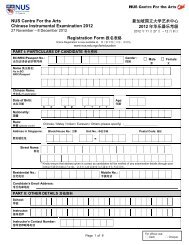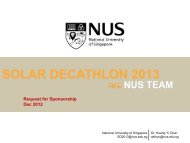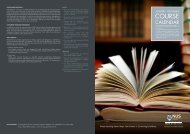SPEECH BY DR TONY TAN KENG YAM, MINISTER ... - NUS - Home
SPEECH BY DR TONY TAN KENG YAM, MINISTER ... - NUS - Home
SPEECH BY DR TONY TAN KENG YAM, MINISTER ... - NUS - Home
Create successful ePaper yourself
Turn your PDF publications into a flip-book with our unique Google optimized e-Paper software.
<strong>SPEECH</strong> <strong>BY</strong> <strong>DR</strong> <strong>TONY</strong> <strong>TAN</strong> <strong>KENG</strong> <strong>YAM</strong>, <strong>MINISTER</strong> OF EDUCATION<br />
AND VICE-CHANCELLOR DESIGNATE, NATIONAL UNIVERSITY OF<br />
SINGAPORE, AT THE WELCOME CONVENTION FOR NEW <strong>NUS</strong><br />
STUDENTS AT THE NATIONAL THEATRE ON WEDNESDAY,<br />
2 JULY 1980 AT 7.00 PM<br />
University Education and the <strong>NUS</strong><br />
This year 3119 students have enrolled to study in the National University of<br />
Singapore. The largest number (671 students) have been chosen to read Arts/Social<br />
Science. Engineering is a close second with 670 students. Then comes Science (613<br />
students), Business Administration (332 students), Accountancy (302 students), Medicine<br />
(170 students), Law (118 students), Architecture (106 students), Building/Estate<br />
Management (99 students), and finally Dentistry (38 students).<br />
(Figures reflect the position as at 1st July 1980. Enrolment of students will continue<br />
until 19th July I980).<br />
You the incoming students were chosen from a pool of 7612 applicants from 13<br />
countries: Singapore, Malaysia, Indonesia, The Philippines, Thailand, Brunei, Hong Kong,<br />
Sri Lanka, Egypt, Iran, Burma, India and the USA. In addition to fulfilling the prescribed<br />
educational requirements, some of you would have undergone additional assessments<br />
before being admitted to the Faculty of your choice. Medical students, for example, would<br />
have gone through the Vocational Assessment Scheme as well as an interview; Dental<br />
students would have been tested for their manual dexterity; Law students would have been<br />
interviewed to find out their competency in English.<br />
To get this far, you would have successfully cleared several educational hurdles -<br />
PSLE, "0" Levels, "A" Levels. You would have come from a much larger cohort of Primary I<br />
pupils (some 50,000 to 60,000 each year) who entered school 12 to 14 years ago. So you<br />
will see that competition for places in the <strong>NUS</strong> is relatively fierce and you are among the<br />
fortunate few who have managed to get onto the fast-speed escalator which hopefully will<br />
carry you to further success in life.<br />
In a special sense you will be a unique generation because you will be the first batch<br />
of freshmen to enter the National University of Singapore. I am sure that you would have<br />
followed closely the public debate over the last few months concerning the merger of<br />
Nanyang University and the University of Singapore. You would not be here this evening if<br />
the debate had not led to a workable solution accepted by NU and SU Councils, staff and<br />
supporters of the two Universities, and the wider community. When the <strong>NUS</strong> students attend<br />
their classes next Monday, a new era in the history of education in Singapore will have<br />
begun.<br />
What can you expect to gain from your stay in the University? How can you best<br />
utilise the next four, five or six years so that you will derive the maximum benefit from your<br />
university education.<br />
These questions cannot be satisfactorily answered without considering a more<br />
fundamental and philosophical conundrum which has puzzled the keenest minds over the<br />
ages and for which there is no universally correct answer. Thoughtful men and women, from<br />
Cardinal Newman to Eric Ashby, have repeatedly addressed themselves to the age-old<br />
theological questions "What should be the aim of a university education?" but the answer still<br />
eludes us.
Universities came into being in the Middle Ages to educate ministers — not Cabinet<br />
ministers but ministers of Religion. Later on the training of lawyers and doctors was added.<br />
Engineering was a late starter and, as a subject, did not gain academic respectability until<br />
after the Second World War. In England and many other European countries, universities<br />
were for a long time bastions of privilege and playgrounds for the upper classes. Their<br />
function was to perpetrate the values and ideals of an established class of gentlemen so that<br />
the status quo could be maintained. In Singapore this can hardly be the role envisaged for<br />
the <strong>NUS</strong>.<br />
It is a wishful academic myth to believe that students enter the University seeking to<br />
be taught how to think critically and independently. This might possibly have happened at<br />
Oxford and Cambridge at one time when undergraduates were drawn largely from the<br />
children of the landed aristocracy but, I think that this is hardly true today when even<br />
students who come from privileged homes have to worry about making a living after they<br />
finish university. There are, of course, a few students who enter the University because they<br />
want to enjoy themselves, some because they have been pressured into doing so by<br />
ambitious parents or conscientious teachers but most students enter university to seek an<br />
education which will enable them to get a good job, security and insurance for their old age.<br />
All this is quite natural and a vice-chancellor who ignores this fact of life, will, I predict, meet<br />
with disaster within a short time.<br />
The question of what students should leave and what professors should teach cannot<br />
be divorced from the larger question of the role of the University in the society which pays its<br />
bills and from which it draws its students.<br />
Singapore today is a young nation, very much in the growth and development phase.<br />
Our economy has an insatiable demand for technological and professional manpower. For<br />
the present I do not see any escape from the necessity to gear university education to the<br />
demands of the market. Much as many may lament the decline of humanistic or liberal<br />
education and the ascendancy of professional and technical studies, our priorities do not<br />
permit any other course. Students want it, society needs it and the university should provide<br />
it.<br />
In some ways one can draw a parallel between our own situation and that of the<br />
American universities in the 1950’s and early 1960’s, when there was general agreement<br />
that the central role of the universities was to advance scientific and technological studies so<br />
that America could triumph over its arch-enemy, Russia. There was little doubt or<br />
introspection and the launching of the Russian space satellite Sputnik, merely confirmed the<br />
correctness of such a course. Thus was the ground laid for the great surge in engineering<br />
and technological research and the concentration on excellence in science and technology<br />
which gave America its commanding lead over the rest of the world.<br />
As has already happened in America, however, the time will come in Singapore when<br />
the academic pendulum will swing the other way, when over-concentration on professional<br />
studies will be regarded as an unnecessary limitation of the role of the University. Those of<br />
you who have applied to study Arts and the Humanities may therefore take comfort. As our<br />
society develops we will find that we need not only engineers, doctors or skilled<br />
administrators but also writers, artists, and musicians who can enrich our cultural life.<br />
While it is right for the <strong>NUS</strong> to concentrate on meeting the nation's immediate needs<br />
for trained manpower, it would be unhealthy and furthermore, unnecessary to confine<br />
university education entirely to the narrow field of vocational studies and to exclude totally all<br />
liberal or humanistic aspects of learning.
In America and Europe, today, much thought is being given to restoring the balance<br />
of general or liberal education vis-a-vis vocational or professional education in the university.<br />
Much of the debate has centred around the concept or a “core curriculum” as mentioned by<br />
the Prime Minister in his talk to the University staff at the end of May.<br />
This concept has attached a great deal of attention both in the popular press and in<br />
academic journals, reportedly much to the surprise of the Dean of the Harvard University<br />
Faculty, Henry Rosovsky, who set the process in motion in February 1978 when he<br />
circulated to the Harvard community copies of his 36-page typescript setting out a set of<br />
guidelines for some changes in that part of the undergraduate programme concerned with<br />
general education.<br />
If you are not inclined to dig through thick volumes and learned journals, may I<br />
recommend that you read two short but succinct articles in the latest issue of Dialogue<br />
which, to my mind, summarises the essentials of the subject. One is a rather critical article<br />
by Adele Simmons, President of Hampshire College. The other is by James Q. Wilson,<br />
Professor of Government at Harvard and formerly Chairman of the University's Task Force<br />
on the Core Curriculum. Understandably he takes a more optimistic view.<br />
It is important that we should be clear about what the Core Curriculum is and what it<br />
is not. As one critic puts it rather unkindly, it is neither a core nor a curriculum ie students are<br />
not all required to take the same courses.<br />
Before the introduction of the core curriculum, an undergraduate at Harvard had to<br />
take 32 one-semester courses to earn enough credits to qualify for the bachelor's degree —<br />
16 in his major field, eight free electives and eight general education electives to be chosen<br />
from more than 800 courses distributed over three broad areas: humanities, natural sciences<br />
and social sciences.<br />
What Dean Rosovsky proposed was that the general education requirement should<br />
be revised to require every undergraduate student to take at least one course in seven or<br />
eight of the following areas: mathematics, natural science, literature, moral philosophy,<br />
foreign cultures, social analysis, history, foreign languages and expository writing. In each of<br />
these areas, students would select from a list of eight to ten approved courses, some<br />
specially designed and others adapted from existing courses.<br />
By and large academics are conservative and this revision although modest in scope,<br />
was widely acclaimed simply because it was the first time that the staff of a major university<br />
had addressed themselves seriously to a difficult problem of undergraduate education.<br />
There are formidable obstacles even in this modest reform. Harvard academics have<br />
spent hundreds of hours in innumerable committees but, as yet, there is no curriculum in<br />
existence.<br />
Some academics expressed honest skepticism concerning, for example, whether<br />
real science could be taught to non-scientists or whether, in the short time allocated to the<br />
subject, a student could gain sufficient mastery of a foreign language to make the effort<br />
worthwhile. What has been achieved after two years of hard work is the passing of enabling<br />
legislation accompanied by a set of guidelines. If all goes well, the scheme may come fully<br />
into effect in 1983 and it may take another five years before the scheme can be fairly judged<br />
a success or failure. As James Wilson puts it "I do not know whether the effort to revitalize<br />
general (ie liberal arts) education will succeed. Harvard is, at best at the end of the<br />
beginning, not the beginning of the end".<br />
As I have mentioned the significance of the Harvard proposal lies not so much in the
proposals themselves but in the fact that, for the first time since the Second World War, a<br />
serious attempt is being made to improve undergraduate education and in a field where<br />
immediate practical or economic gains are not evident.<br />
This is a swing away from the emphasis on research and graduate schools which<br />
had been a hallmark of the modern American university. It is a return to the concept of the<br />
mediaeval university which was established not to undertake research but to transmit values<br />
and traditions from one generation to another.<br />
Whatever be the eventual fate of Harvard's attempt to put new life into liberal<br />
education, it will be worth our while to watch their efforts and perhaps learn from them at<br />
some future date.<br />
One aspect however, which we can consider introducing is the emphasis on<br />
expository writing. Those of you who were not able to get P4 or better in your “A” level<br />
General Paper have had to sit for the Qualifying English Test. If you fail you will be required<br />
to take a remedial English course.<br />
I was interested to learn from Alan Heimert, Head of Harvard's Department of<br />
English, that Harvard requires all freshmen to do one-semester course in expository writing.<br />
For those whose English is poor, the course teaches them to write grammatical,<br />
understandable English. For those whose English is adequate, the course helps to realise<br />
that they can write in an even better, crisper style and that the effort to transmit one's<br />
thoughts in clear, unambiguous language requires constant application.<br />
To conduct the course well requires considerable manpower resources as its<br />
success depends on close and personal supervision, even down to individual tuition when<br />
necessary. Teachers cannot be recruited overnight so all of you can breathe a sigh of relief.<br />
This new burden will not be inflicted on those present today but I cannot promise the same<br />
for future generations of students.<br />
Finally, what advise can I give to you who are now entering University?<br />
First, master your subject. Whether you are a historian, mathematician, engineer,<br />
doctor, accountant, lawyer or architect, you should know your brief. It is of little benefit to<br />
worry about general education if you cannot master one particular discipline. This is your<br />
primary duty and at the risk of expounding the obvious, this is where you should be paying<br />
most attention.<br />
It is not through acquiring a smattering of knowledge in a number of unrelated fields<br />
that you learn how to think clearly, logically and confidently. By all means, be an amateur in<br />
a number of fields but aim to be a professional in at least one.<br />
You would, however, miss much if this is all that you strive for in your university<br />
education. Participate in student activities and if you plan your time-table carefully you will<br />
find that this will not detract from your academic work. Rather it will enrich your<br />
undergraduate life and through it you will be able to broaden your friendships to encompass<br />
not only lecturers and fellow students from your own faculty but also others from unrelated<br />
faculties or departments. In this way you will make progress towards getting a rounded<br />
education.<br />
In conclusion may I bid you welcome to the National University of Singapore. I hope<br />
that we will see much of each other over the next few years and that all of you will get<br />
through your examinations without mishap and with good honours.


